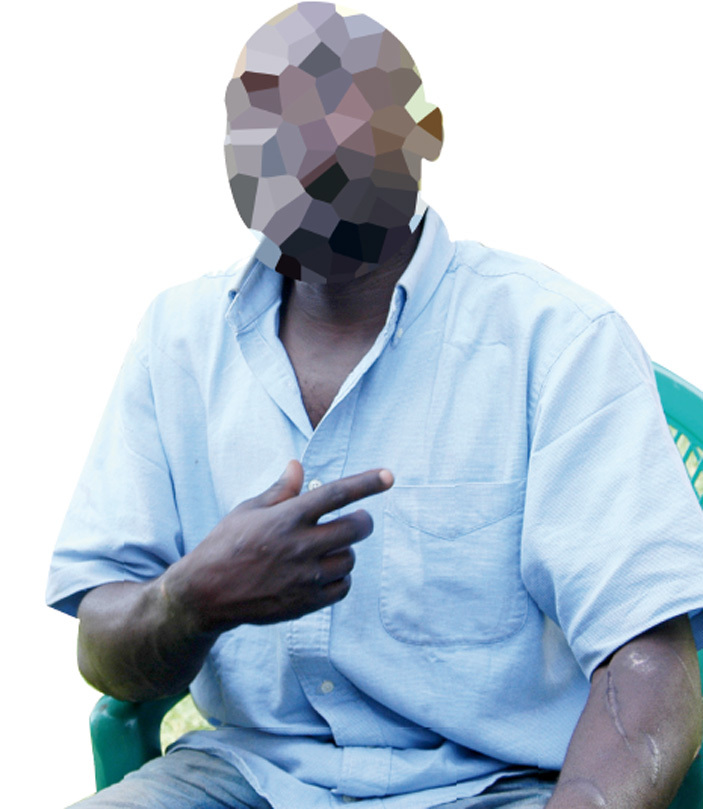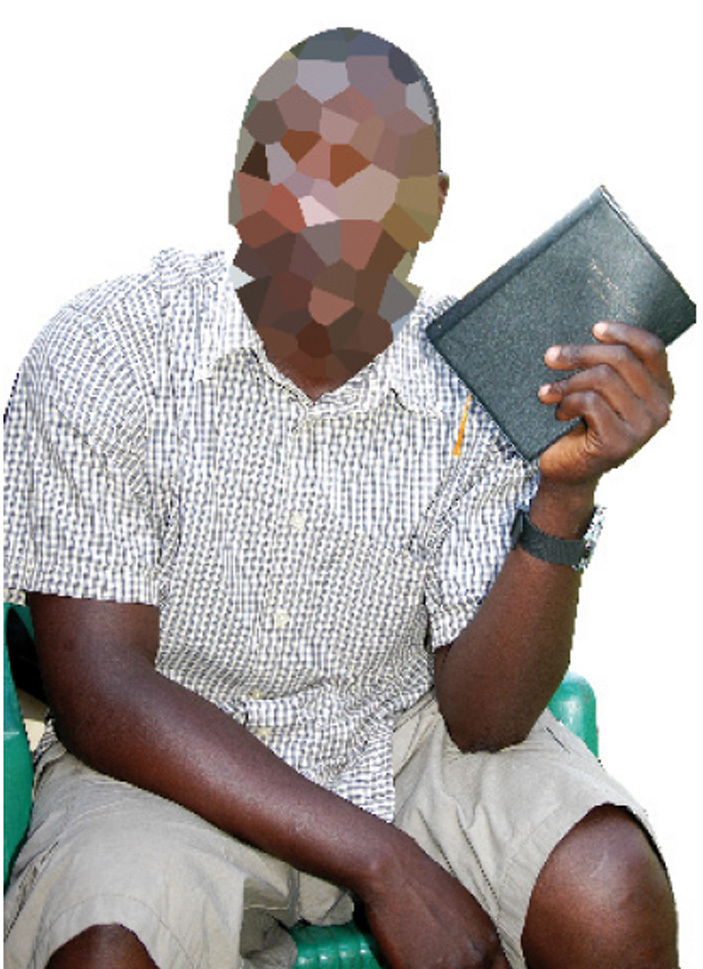Amazing grace: 60 Kifeesi turn to God
Nov 23, 2016
These are the people who have been terrorising the city and villages around Kampala. Now they are servants of God,” said Pastor Robert Kayanja

Youth meeting Kampala Minister Beti Kamya and Pastor Kayanja at Miracle Centre Cathedral in Rubaga. Photos by Roderick Ahimbazwe and Ronnie Kijjambu
Drugs and marijuana are a major component of their daily menu. They are fearless, cunning and shrewd. Part of the group known as Kifeesi, denounced their rogue life Gloria Nakajubi writes
These are the people who have been terrorising the city and villages around Kampala. Now they are servants of God," said Pastor Robert Kayanja as he ushered on stage a group of youth.
The group had denounced their rogue life at the ongoing convention at the Miracle Centre Cathedral in Rubaga, a city suburb.
From some of the most trivial of crimes to the gruesome murders, these young men have done it all. They have known nothing less than anger, hatred, brutality and abuse. They had to survive by all means.
These are some of the stories of the over 60 former members of what has come to be known as the infamous ‘Kifeesi', a group of mostly young people terrorising Kampala dwellers on the streets and in their homes. I chatted with them recently and here is a story of their lives explored.
Confessions
Note: For safety and security purposes, we have maintained the sources' street names and not real names
I came to the street when I was three years old — Cobra
They call me Cobra because I am dangerous. I have been on the street from the age of three. I am now 20 years old. I do not know my parents and cannot tell how I ended up here.
I do not remember calling anyone mummy. I do not remember anyone looking out for me. I was in-charge of myself in the harshest of circumstances. I have heard about love, however I am not sure I know what it means to love and be loved.
When I was younger, I used to eat food from the rubbish pits and sometimes collect used plastics and other scrap pieces for sale. I later joined one of the gangs and was initiated in criminal activities. The only inspiration in the ghetto is to become a hard-core criminal and rise through the ranks to lead a gang.
We operated on Entebbe Road and would break into houses and steal every valuable thing that we came across. Money was always top on our priority list. Entebbe Road is also quite convenient to get a taxi back to Kisenyi with your loot.
I have spent half of my life literally in prison. But the most painful one was when I was thrown in Nyamushekera Prison in western Uganda for three years for a crime I did not commit. Well I am sure, if I had an opportunity to participate, I would have. But this time round, I had not done anything wrong. They suspected me of having been a part of a gang terrorising the area.
In an attempt at a decent way of living, Cobra had moved to Kabwohe to work as a porter at one of the banana markets. This was at the age of 15. However after a few months, Police arrested all the young people they suspected to be engaging in crime and because he (Cobra) had no identification or anyone to lay claim on him, he did not survive.
I was released with sh8,000 and had to find my way back to Kisenyi, the place I call home and resume my earlier trade, breaking into houses.
 Kabaya has since reformed and turned to God
Kabaya has since reformed and turned to God
We chopped off his head — Kabaya
I led a gang of about 20. I came to the street at 15 years of age and I am now 30. Look at me. All these scars you are seeing are either from beatings and cuts during missions or fighting within the gang.
I have stolen almost everything as long as it has a price to it. We just walk to someone and tell them to surrender whatever they have including the clothes and shoes they are wearing.
I remember this one time. We spent the day roaming around Kampala Road waiting for any unsuspecting individual to come out of one of the banks around that area. Before long, a gentleman walked out of the bank carrying a bag and instinctively we zeroed on him as our target. He drove off towards Wandegeya and we followed. As soon as he opened his office, we were right behind him and together we entered. We asked him to give us the bag (at knife-point) and at the end of the day, we had a cool sh20m.
The one time I have been directly involved in killing was when one of our own members was suspected of hatching a backstabbing plan. At night, we attacked his house. He was sound asleep when we arrived and there we were standing right at his bedside. Before he could even utter a word, I asked why he was planning on selling me out to the enemy (another gang).
As he went down begging for mercy, I signalled one of my boys to dig a knife right through his heart. We chopped off his head, placed it on the table just so the wife could have something to keep and went out to the lake where we dumped the other part of his body. For about three minutes, we stood there and watched as the soul sailed off and disappeared in the dark of the waters. Fulfilled? No. But life had to go on.
Everyone in the gang knows the rules. You do not threaten the leader. We have each other's back.
I killed two cops —Kifeesi 1
I have killed two policemen. One was at the Martyrs shrine in Namugongo. I wanted to snatch a necklace from a white lady, but the policeman was standing in my way. I pushed him down the stairs and I don't know what he hit his head on, but he died instantly.
The other was at Namboole stadium. We had become rowdy and the Police wanted us out of the stadium. During the scuffle, I hit one of the policemen and he fell on the ground and died.
Since I started stealing in 2010, I have never been arrested, but I am tired. I repent.
I stole the clothes I am wearing — KIfeesi 2
I am a teacher by profession, but I have never stepped in class even a single day. All I have ever wanted to do was steal.
We had been stealing from Nakivubo Channel for a while until police chased us from there. Seven of us moved base to Queen's Way.
I have stolen everything imaginable. Even the clothes I am wearing right now are stolen. I hated church and God after my parents were killed during the 2000 Kibwetere inferno. Since then, I had never stepped in church again.
The journey to Miracle Centre
According to Ivan Lwanga, the in-charge of the rehabilitation programme of the young people off the streets, these are a product of the on-going revival convention at the church that has been code-named 77 Days of Glory.
Most of these were led to church by street evangelists while others just walked in after watching the sessions on television.
Lwanga explained that just as has been with previous similar programmes such as one that involved rehabilitation of prostitutes in 2014 and rehabilitation of street children in 2001 among others, there is an equally comprehensive programme to rehabilitate these young people.
 Kifeesi 1 says he is tired of stealing
Kifeesi 1 says he is tired of stealing
The plan involves feeding, accommodation, medication, education and skilling. They plan to have these equipped with such practical skills as soap-making, electrical installation and repairs, shoe-making, tailoring, catering, photography and videography, agri-business, driving, welding and craft making, among others.
"All we need is to restore hope and confidence in their lives. They don't trust any other way of life other than what they have lived. It will therefore take a lot of effort to get that out," he says.
According to Lwanga, many are already being allocated responsibilities at church to help build a sense of confidence and responsibility in them and many are showing positive signs.
Activities such as sports, leadership roles and bible study have over the years, according to Lwanga, proved to psychologically influence such people's behaviour.
But this comes with a huge financial cost to the church and as Lwanga explains, there is need for support especially from the Government through the different ministries.
Speaking after meeting the group of now ‘born again' youth, Kampala Minister, Betty Kamya highlighted that as a nation, Uganda has a responsibility towards children and youth on the streets.
"Government should not leave the welfare of street children to individuals, ministry of Youth should come up with a program to partners that are taking care of such children with housing, health and feeding," she said.
She added that the government of Uganda through its youth fund programme should support such youth to start up income generating ventures so they do not fall back into the life of crime.
Pastor Robert Kayanja, who hosted the minister, stated that having children on the streets poses a security threat to the country as these eventually end up in criminal gangs that terrorise the population.
"Ugandans should start taking care of their own people and not wait for donors. It is a shame that we have people that move to offices, work and have a lot of money when their children engage in prostitution and live on streets," he said.
Slums breeding young criminals
Kisenyi, one of the major ghettos located a stone's throw away from the city centre, is home to these and hundreds others. Many of them are not sure how they ended up there. But here, they were accepted, protected and mentored.
The trenches through which Kampala's litter and sewage relentlessly flows are their hideouts. They spend their days on top of cargo containers turned into shops as they strategise their next mission.
Drugs and marijuana are a major component of their daily menu. This not only keeps them awake but also gives them the pseudo bravery. They are fearless, cunning and shrewd. They have rules, leaders and when you are out of line, you pay a price; sometimes with your life.
A typical day in kifeesi
The gang members usually spend the day resting, for they would have stayed up all night ‘working'. A ‘good' night escapade comes with some money in their pockets; they turn into spendthrifts during the day.
"You are rich. Everyone bows to you for that period. And by the end of the day, you have no money left," one of them narrates.
They have to be alert at all times. This explains why they feed on marijuana. For many of them, sleep is a rare privilege.
As the dark sets in, the gang members are up for their next move. By 7:00pm, they have figured out the ‘operation' for that night. It is either to snatch phones, bags and other valuables or break into houses. Pick-pocketing usually comes in as a by the way.
A typical gang setting out for an operation does not exceed six. Preliminary plans involve the place and time to be spent on the mission. Whether successful or not, if the set time is 10 minutes, every one withdraws back home — Kisenyi.
"The gang leader goes ahead of the squad as the others follow closely. I know where I can hit you into a daze. The one next in line picks whatever our target has and another person is in charge of carrying the loot. By the time, you regain consciousness and make an alarm, there is no one in sight," narrates one Kabaya.
In case of a house break-in mission, the numbers are still kept to a minimum. They will carry out thorough surveys on which areas to attack. Their preferred targets are apartments, where they can break into several houses at a go.
Back in Kisenyi, there are guys that have mastered the art of duplicating keys. Just one key can open different kinds of locks.
When a target house is identified, one member stays at the gate. Another stands by the door to the house. Two enter and pick whatever valuables they can get a hold of, preferably television, decoders, DVD players, music systems and laptops, among others. The other thing they look out for is cash.
"You have to make sure you look for the trouser the man wore that day. There are high chances of finding money there or you check in the bible at the bedside, or the drawers. You also force the occupants to give you the money with death threats," he says.
One of the boys I interviewed belonged to a gang that had specialised in stealing cars. These would go out and drive off just about any car. Fortunately or unfortunately, most of his peers have since been killed on missions gone bad while others are in prison.

Who are their clients?
Do not be surprised that your next acquisition from one of the shops in town is actually part of the Kifeesi loot.
They have a chain of business people they work with who are just a call away. These influence what they go out to steal, depending on market demands.
Most items are sold at giveaway prices; for example laptops worth sh1m are sold for as low as sh200,000. All they want is to make quick cash for the day.
Stolen cars are usually smuggled out of the country to DRC and South Sudan. But sometimes, these are sold to motor vehicle mechanics in the city.
"We would not just drive off any car. It had to be in relatively good condition and as tipped by our clients, one on demand," one confesses.
Where do they come from?
It is a question that most times goes unanswered or rather the intended respondent does not know how to answer what seems like a ridiculous question.
"I don't know how I came here. But I found myself here. But even if I was to ask, who can I ask. I do not have family. It is just me," says one of the group members.
They make their families on the street and your gang members become your family.
But from the interactions, some ran away from their homes due to abuse, mistreatment, poverty or sheer need to get away. Some are orphans.
Although the majority of the children on Kampala streets are Karimojong, the other parts of the country contribute to the growing numbers.
UNICEF statistics show that there are 10,000 street children in Uganda. The streets, as seen from the lives of these now confessed Christians, groom some of the notorious gangs in the city.
Additional reporting by Lawrence Mulondo
